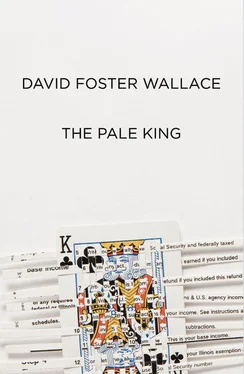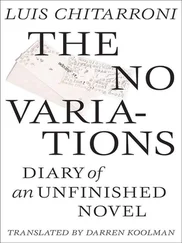David Wallace - The Pale King - An Unfinished Novel
Здесь есть возможность читать онлайн «David Wallace - The Pale King - An Unfinished Novel» весь текст электронной книги совершенно бесплатно (целиком полную версию без сокращений). В некоторых случаях можно слушать аудио, скачать через торрент в формате fb2 и присутствует краткое содержание. Год выпуска: 2011, Издательство: Little, Brown & Company, Жанр: Современная проза, на английском языке. Описание произведения, (предисловие) а так же отзывы посетителей доступны на портале библиотеки ЛибКат.
- Название:The Pale King: An Unfinished Novel
- Автор:
- Издательство:Little, Brown & Company
- Жанр:
- Год:2011
- ISBN:нет данных
- Рейтинг книги:3 / 5. Голосов: 1
-
Избранное:Добавить в избранное
- Отзывы:
-
Ваша оценка:
- 60
- 1
- 2
- 3
- 4
- 5
The Pale King: An Unfinished Novel: краткое содержание, описание и аннотация
Предлагаем к чтению аннотацию, описание, краткое содержание или предисловие (зависит от того, что написал сам автор книги «The Pale King: An Unfinished Novel»). Если вы не нашли необходимую информацию о книге — напишите в комментариях, мы постараемся отыскать её.
The Pale King
The Pale King: An Unfinished Novel — читать онлайн бесплатно полную книгу (весь текст) целиком
Ниже представлен текст книги, разбитый по страницам. Система сохранения места последней прочитанной страницы, позволяет с удобством читать онлайн бесплатно книгу «The Pale King: An Unfinished Novel», без необходимости каждый раз заново искать на чём Вы остановились. Поставьте закладку, и сможете в любой момент перейти на страницу, на которой закончили чтение.
Интервал:
Закладка:
Anyhow, at one juncture, I, the Christian roommate, and his girlfriend — who might technically have been his fiancée — were all sitting around in the suite’s social room, and for some reason — quite possibly unprompted — the girlfriend was seeing fit to tell me the story of how she was ‘saved’ or ‘born again’ and became a Christian. I remember almost nothing about her except for the fact that she wore pointy-toed leather cowboy boots decorated with flowers — that is, not cartoons of flowers or isolated floral designs but a rich, detailed, photorealist scene of some kind of meadow or garden in full bloom, so that the boots looked more like a calendar or greeting card. Her testimony, as best as I can now recall, was set on a certain day an unspecified amount of time before, a day when she said she was feeling totally desolate and lost and nearly at the end of her rope, sort of wandering aimlessly in the psychological desert of our younger generation’s decadence and materialism and so on and so forth. Fervent Christians are always remembering themselves as — and thus, by extension, judging everyone else outside their sect to be — lost and hopeless and just barely clinging to any kind of interior sense of value or reason to even go on living, before they were ‘saved.’ And that she happened, on this one day, to be driving along a county road outside her hometown, just wandering, driving aimlessly around in one of her parents’ AMC Pacer, until, for no particular reason she was aware of inside herself, she turned suddenly into the parking lot of what turned out to be an evangelical Christian church, which by coincidence happened to be right in the middle of holding an evangelical service, and — for what she again claimed was no discernible reason or motive she could have named — she wandered aimlessly in and sat down in the rear of the church in one of the plushly cushioned theater-type seats their churches tend to use instead of wooden pews, and just as she sat down, the preacher or father or whatever they called them there evidently said, ‘There is someone out there with us in the congregation today that is feeling lost and hopeless and at the end of their rope and needs to know that Jesus loves them very, very much,’ and then — in the social room, recounting her story — the girlfriend testified as to how she had been stunned and deeply moved, and said she had instantly felt a huge, dramatic spiritual change deep inside of her in which she said she felt completely reassured and unconditionally known and loved, and as though now suddenly her life had meaning and direction to it after all, and so on and so forth, and that furthermore she had not had a down or empty moment since, not since the pastor or father or whatever picked just that moment to reach out past all the other evangelical Christians sitting there fanning themselves with complimentary fans with slick full-color ads for the church on them and to just kind of verbally nudge them aside out of the way and somehow address himself directly to the girlfriend and her circumstances at just that moment of deep spiritual need. She talked about herself as though she were a car whose pistons had been pulled and valves ground. In hindsight, of course, there turned out to be certain parallels with my own case, but the only real response I had at the time was that I felt annoyed — they both always annoyed the hell out of me, and I can’t remember what I could have been doing that day sitting there in conversation with them, the circumstances — and I can remember making a show of having my tongue pressing against the inside of my cheek in such a way as to produce a visible bulge in my cheek and giving the girlfriend in the boots a dry, sardonic look, and asking her just what exactly had made her think the evangelical pastor was talking to her directly, meaning her in particular, as probably everyone else sitting there in the church audience probably felt the same way she did, as pretty much every red-blooded American in today’s (then) late-Vietnam and Watergate era felt desolate and disillusioned and unmotivated and directionless and lost, and that what if the preacher or father’s saying ‘Someone here’s lost and hopeless’ was tantamount to those Sun-Times horoscopes that are specially designed to be so universally obvious that they always give their horoscope readers (like Joyce every morning, over vegetable juice she made herself in a special machine) that special eerie feeling of particularity and insight, exploiting the psychological fact that most people are narcissistic and prone to the illusion that they and their problems are uniquely special and that if they’re feeling a certain way then surely they’re the only person who is feeling like that. In other words, I was only pretending to ask her a question — I was actually giving the girlfriend a condescending little lecture on people’s narcissism and illusion of uniqueness, like the fat industrialist in Dickens or Ragged Dick who leans back from a giant dinner with his fingers laced over his huge stomach and cannot imagine how anyone in that moment could be hungry anywhere in the whole world. I also remember that the Christian’s girlfriend was a large, copper-haired girl with something slightly wrong with one of the teeth on either side of her front teeth, which overlapped one of the front teeth in a distracting way, because during that day’s conversation she gave me a big smug smile and said that, why, she didn’t think that my cynical comparison was any kind of refutation or nullification of her vital Christ experience that day or its effect on her inner rebirth at all, not one little bit. She may have looked over at the Christian for reassurance or an ‘Amen’ or something at this juncture — I can’t remember what the Christian was doing all through this exchange. I do, though, remember giving her a big, exaggerated smile right back and saying, ‘Whatever,’ and thinking inwardly she wasn’t worth wasting time arguing with, and what was I even doing here talking to them, and that she and Pepsodent Boy deserved one another — and I know sometime soon after that I left them together in the social room and went off while thinking about the whole conversation and feeling somewhat lost and desolate inside, but also consoled that I was at least superior to narcissistic rubes like these two so-called Christians. And then I have a slightly later memory of me standing at a party with a red plastic cup of beer and telling somebody the story of the interchange in such a way that I appeared smart and funny and the girlfriend was a total fool. I know I was nearly always the hero of any story or incident I ever told people about during this period — which, like the thing with the lone sideburn, is a memory that makes me almost wince now.
Anyhow, it seems like a very long time ago. But the point of even remembering the conversation, I think, is that there was an important fact behind the Christian girl’s ‘salvation’ story which I simply hadn’t understood at the time — and, to be honest, I don’t think she or the Christian did, either. It’s true that her story was stupid and dishonest, but that doesn’t mean the experience she had in the church that day didn’t happen, or that its effects on her weren’t real. I’m not putting it very well, but I was both right and wrong about her little story. I think the truth is probably that enormous, sudden, dramatic, unexpected, life-changing experiences are not translatable or explainable to anyone else, and this is because they really are unique and particular — though not unique in the way the Christian girl believed. This is because their power isn’t just a result of the experience itself, but also of the circumstances in which it hits you, of everything in your previous life-experience which has led up to it and made you exactly who and what you are when the experience hits you. Does that make any sense? It’s hard to explain. What the girl with the meadow on her boots had left out of the story was why she was feeling so especially desolate and lost right then, and thus why she was so psychologically ‘primed’ to hear the pastor’s general, anonymous comment in that personal way. To be fair, maybe she couldn’t remember why. But still, all she really told was her little story’s dramatic climax, which was the preacher’s comment and the sudden inward changes she felt as a result, which is a little like telling just the punch line of a joke and expecting the person to laugh. As Chris Acquistipace would put it, her story was just data; there was no fact-pattern. On the other hand, it’s always possible that the 25,834 words so far of my own life-experience won’t seem relevant or make sense to anyone but me — which would make this not unlike the Christian girl’s own attempt to explain how she got to where she was, assuming she was even sincere about the dramatic changes inside. It’s easy to delude yourself, obviously.
Читать дальшеИнтервал:
Закладка:
Похожие книги на «The Pale King: An Unfinished Novel»
Представляем Вашему вниманию похожие книги на «The Pale King: An Unfinished Novel» списком для выбора. Мы отобрали схожую по названию и смыслу литературу в надежде предоставить читателям больше вариантов отыскать новые, интересные, ещё непрочитанные произведения.
Обсуждение, отзывы о книге «The Pale King: An Unfinished Novel» и просто собственные мнения читателей. Оставьте ваши комментарии, напишите, что Вы думаете о произведении, его смысле или главных героях. Укажите что конкретно понравилось, а что нет, и почему Вы так считаете.












